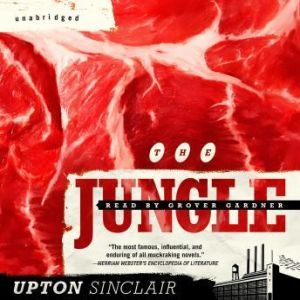

The Jungle
Author: Upton Sinclair
Narrator: Grover Gardner
Unabridged: 13 hr 17 min
Format: Digital Audiobook Download
Publisher: Blackstone Audio, Inc.
Published: 05/06/2011


Author: Upton Sinclair
Narrator: Grover Gardner
Unabridged: 13 hr 17 min
Format: Digital Audiobook Download
Publisher: Blackstone Audio, Inc.
Published: 05/06/2011
Upton Sinclair was born in Baltimore, Oregon, on September 20, 1878, and was moved to New York City in 1888. Although his own family were extremely poor, he spent periods of time living with his wealthy grandparents. An intelligent boy, he did well at school, and at age fourteen, he entered New York City College. Soon afterwards, he had his first story published in a national magazine. Over the next few years Sinclair funded his college education by writing stories for newspapers and magazines. By age seventeen, Sinclair was earning enough money to enable him to move into his own apartment while supplying his parents with a regular income.
Sinclair's first novel, Springtime and Harvest, was published in 1901. He followed this with The Journal of Arthur Stirling, Prince Hagen, Manassas, and A Captain of Industry, but they all sold poorly.
In the early 1900s Sinclair became an active socialist, eventually joining with Jack London, Clarence Darrow, and Florence Kelley to form the Intercollegiate Socialist Society. In 1904, the editor of the socialist journal Appeal to Reason commissioned Sinclair to write a novel about immigrant workers in the Chicago meat-packing houses. The owner of the journal provided Sinclair with a $500 advance, and after seven weeks' research, Sinclair wrote The Jungle. Serialized in 1905, the book helped to increase the journal's circulation to 175,000. However, Sinclair had his novel rejected by six publishers. Sinclair decided to publish the book himself, and after advertising his intentions in Appeal to Reason, he got orders for 972 copies. When he told Doubleday of these orders, it decided to publish the book. The Jungle was an immediate success, eventually selling over 150,000 copies all over the world.
Sinclair's next few novels—The Overman, The Metropolis, The Moneychangers, Love's Pilgrimage, and Sylvia—were commercially unsuccessful.
In 1914, Sinclair moved to Croton-on-Hudson, a small town close to New York City where there was a substantial community of radicals. He pleased his socialist friends with his anthology of social protest, The Cry for Justice. Sinclair continued to write political novels, including King Coal, which is based on an industrial dispute, and Boston. He also wrote books about religion (The Profits of Religion), newspapers (The Brass Check), and education (The Goose-Step and The Goslings).
In 1940, World's End launched Sinclair's eleven-volume series on American government. His novel Dragon's Teeth, on the rise of Nazism, won him the Pulitzer Prize. By the time Sinclair died in November 1968, he had published more than ninety books.
Naturally, my high school English teacher felt it necessary to assign "The Jungle" to read over Thanksgiving break. As my Dad carved the turkey, the conversation went something like this: MOM: Could you pass the turkey? ME: Oh, yeah, great, why don't we pass the meat that untold numbers of Slavik immi......more
Every day in New York they slaughter four million ducks five million pigs and two thousand doves for the pleasure of the dying, a million cows a million lambs and two million roosters, that leave the sky in splinters. —Federico García Lorca I expected to dislike this book, because it is a book aimed at pro......more
(written 6-03) Wow. Now I can see why this book had such a big impression on those who read it in the early twentieth century. Really heart-wrenching (and gut-wrenching) stuff. There's the famous quote that Sinclair said he aimed for the public's heart and hit it in the stomach instead. I guess peopl......more
It's been a while since I read it, but I believe this book features a precocious young boy named Mowgli Rudkus who was raised by wolves. After singing a bunch of songs with bears and orangutans in the jungles of India, Mowgli immigrates to turn-of-the-century Chicago where he lives in abject poverty......more
I have a tendency to be easily swayed by arguments, so I asked a well-read friend for an antidote to Ayn Rand's ATLAS SHRUGGED. She suggested this book. If I ever get that wish where you get to resurrect people and have them at a dinner party, I'm going to have Ayn Rand and Upton Sinclair there toge......more